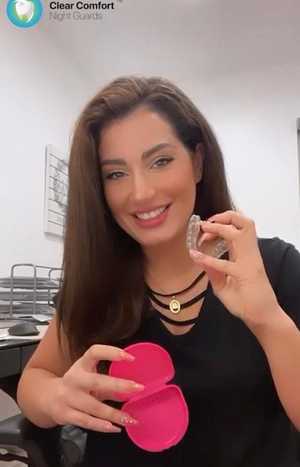Do Dental Guards Affect Speech? Common Questions Answered

Dental guards, often referred to as mouth guards or night guards, are essential dental appliances designed to protect your teeth from grinding, clenching, or injury. They serve as a shield, preventing damage and discomfort that can result from these habits. While custom made nightl guards are effective in safeguarding your oral health, many people wonder whether they have any impact on speech.
This blog discusses common questions and concerns regarding the impact of dental guards on speech and provides practical tips for adapting to them comfortably.

Dental Guards and Speech: Common Concerns
The impact of dental guards on speech is a common concern for those considering using them. Here are some of these concerns.
Speech Impediment
One common concern is that dental guards might lead to a speech impediment. It's natural to be worried about sounding different with a foreign object in your mouth.
Clarity of Speech
Individuals also wonder if their speech will become less clear when wearing dental guards. Clarity in speech is crucial in various social and professional settings.
Pronunciation
For some, pronunciation and articulation are important aspects of their daily lives, and they may fear that dental guards will hinder these skills.

Tips for Adapting to Dental Guards Comfortably
If you find that your dental guard affects your speech, don't worry; there are ways to adapt comfortably. Here are some practical tips to help you through the adjustment phase.
Practice Speaking
One of the most effective ways to adapt to dental guards is to practice speaking with them. Spend time speaking, reading out loud, and even singing while wearing the guard. This will help your mouth get used to the appliance.
Start Slowly
When you first start wearing a dental guard, give yourself time to adapt. Begin by wearing it for short periods during the day and gradually increase the duration. This gradual approach can make the adjustment more manageable.
Speak Slowly and Clearly
To minimize speech difficulties, focus on speaking slowly and enunciating words clearly. Over time, you'll become more adept at articulating with the dental guard in place.
Stay Hydrated
Dry mouth can exacerbate speech problems with dental guards. Make sure you stay well-hydrated to help keep your mouth and lips lubricated, making it easier to speak.
Tongue Placement Practice
Practicing proper tongue placement can greatly assist in overcoming speech difficulties with dental guards. Gently push your tongue against the roof of your mouth, behind your front teeth, while speaking. This can help you regain control over your speech and minimize lisping or other pronunciation issues. Over time, you'll develop muscle memory and find it easier to speak naturally with the dental guard in place.
Speech Exercises
Engage in speech exercises to enhance your articulation while wearing a dental guard. Exercises like tongue twisters or vocal warm-ups can help improve your speech clarity. Repeating these daily exercises can gradually strengthen your tongue and oral muscles, making it easier to speak comfortably with the dental guard.
Record Yourself Speaking
Recording yourself while speaking with the dental guard in place can be a valuable self-assessment tool. Use your smartphone or a recording device to capture your speech. By listening to the recordings, you can identify specific words or sounds that you find challenging to pronounce. This self-feedback can help you pinpoint areas for improvement and practice more effectively.

FAQs About Dental Guards and Speech
To address the most common concerns, check out some frequently asked questions about dental guards and speech.
FAQ#1: Can Dental Guards Cause a Lisp?
Yes, dental guards can cause a temporary lisp or difficulty pronouncing certain sounds. This is often due to the bulk and shape of the appliance. However, with practice, lisps usually diminish as you become more accustomed to speaking with the dental guard.
FAQ#2: How Long Does It Take to Adapt to a Dental Guard?
Adaptation times vary from person to person. Some may adjust to dental guards within a few days, while others may take a few weeks. Consistent practice and patience are key to a smoother transition.
FAQ#3: Are There Any Tricks to Improve Speech with a Dental Guard?
Aside from the tips mentioned earlier, it can be helpful to practice speaking with a dental guard while looking in a mirror. This allows you to observe your mouth movements and make necessary adjustments.

Clear Comfort Night Guards: The Solution
When contemplating the impact of teeth grinding guard on speech, Clear Comfort Night Guards emerges as the go-to choice for those seeking the best custom night guards. Our custom-made night mouthguard for sale are thoughtfully designed to address your dental health needs while maintaining speech clarity. We offer a variety of dentist-recommended night guards, each tailored to meet your specific needs without compromising your comfort.
Don't let concerns about the impact of dental guards on your speech deter you from addressing issues such as teeth grinding or jaw pain! Contact us today and order custom dental guards online.







